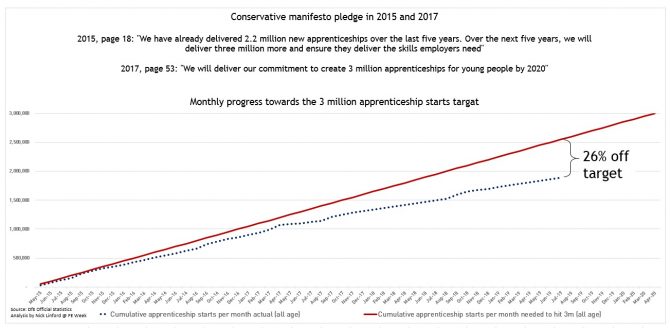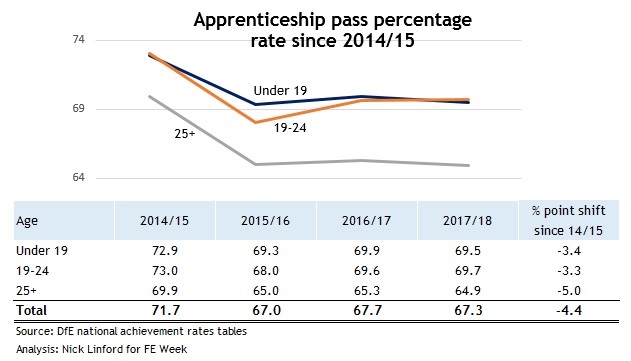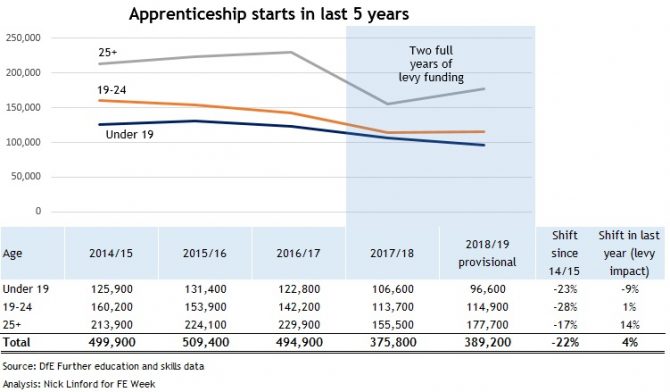The Conservative Party has said they will launch a £600 million a year “new National Skills Fund” if they form a government after the general election on 12 December.
The Prime Minister, Boris Johnson, has launched the manifesto – entitled Get Brexit Done, Unleash Britain’s Potential – in the West Midlands today.
> CLICK HERE to download the manifesto document
> CLICK HERE to download the manifesto costing document
In addition to the £3bn over 5 years and as reported by FE Week last week, there is close to £2 billion available over the same period for capital ‘estate upgrade’ funding. The manifesto costings document shows the additional investment will start from April 2021.
The manifesto says: “This is new funding on top of existing skills funding”, so believed to be additional investment for a “range courses including apprenticeships.”
The Conservative Party website describes the additional investment as:
“Right to Retrain and a £3 billion National Skills Fund
- We will establish a new National Skills Fund as the first step towards a “Right to Retrain”. We will invest £600 million a year, £3 billion over the Parliament, into the Fund. This is new funding on top of existing skills funding. We expect this to include funding for a range courses including apprenticeships. A proportion of the Fund will be reserved for further strategic investment in skills and it comes on top of existing skills and training programmes.
- We will consult widely on the design of the Fund. The Treasury will consult widely on the final design of the Fund to ensure that the money is invested wisely and delivers the best possible outcomes for individuals and businesses. The full details will be set out in the first Spending Review of a Conservative majority Government. We will have strong quality assurance mechanisms in place.
- It is our ultimate ambition to establish a Right to Retrain. Over time, it is our ambition to establish a Right to Retrain for all adults. Conservatives have previously empowered millions of people to own their own home with the Right to Buy. It is our ultimate ambition to empower millions of people in the future with the skills to achieve their potential, keep pace with technological change and embrace lifelong learning.”
Sector reaction, as it comes in:
Association of Employment and Learning Providers
Chief executive Mark Dawe says: “AELP warmly welcomes the additional funding promised for skills, because Brexit means that we need to train or retrain more home-grown talent. All three main parties appear committed to some form of skills account for individual learners which we would consider a positive step with the right to train or retrain. Equally positive would be the establishment of the £3bn National Skills Fund if it is allocated correctly to employers and learners to encourage good quality training provision.
“The Conservatives are right to aim to ‘level-up’ opportunities for small businesses. Right now, SMEs are being starved of funding to offer apprenticeships to young people across the country and the proposed Fund could actually be swallowed up in its entirety by the need to restore the funding smaller businesses used to receive for apprenticeships before the levy was introduced. But AELP looks forward to making constructive proposals on the design of the National Skills Fund.”
Sixth Form Colleges Association
Chief executive Bill Watkin said:“Although today’s manifesto does not contain a specific commitment on 16 to 18 education, the current government used September’s spending round to make the first meaningful investment in sixth form education since 2010 and we are hopeful that a future Conservative administration would build on this progress.
“However, we are surprised that the manifesto has not earmarked any capital funding to deal with the sharp demographic increase in sixth form students.
“We estimate that an additional 260,000 16 to 18 years will be participating in education by 2028, so a capital expansion fund should be a major priority for the party that wins next month’s election.”
Association of Colleges
Chief executive David Hughes said: “I welcome the Conservative Party reference to the vital role colleges play in society and to the plans to invest in the training and skills of adult. The pledge to make colleges ‘excellent places to learn’ is backed by long overdue capital investment of £2 billion which will make a big impact.
“This attitude to colleges, skills and retraining will be vital in creating an education system that is fit for the future and which supports a more inclusive economy.I am worried, though, that there is no commitment to raise the funding for 16 to 18 year olds beyond the very modest increase announced in September.
“Neither is there mention of the sustainable investment needed across all of post-16 education and skills, including apprenticeships.The National Skills Fund has real potential but will not be enough on its own given the severe cuts to adult learning budgets and the pressures on funding for apprenticeships for SMEs and young people.
“Nonetheless, the Conservative Party has joined the other major parties in this election campaign in promising big increases in college investment. Colleges already support over 2.2 million people every year, but could do so much more with the increased investment promised in this election so far.
“If followed through, by whichever government comes to power, this is a huge step in the right direction which we are ready to support in helping to make lifelong learning and opportunities for all a reality.”





